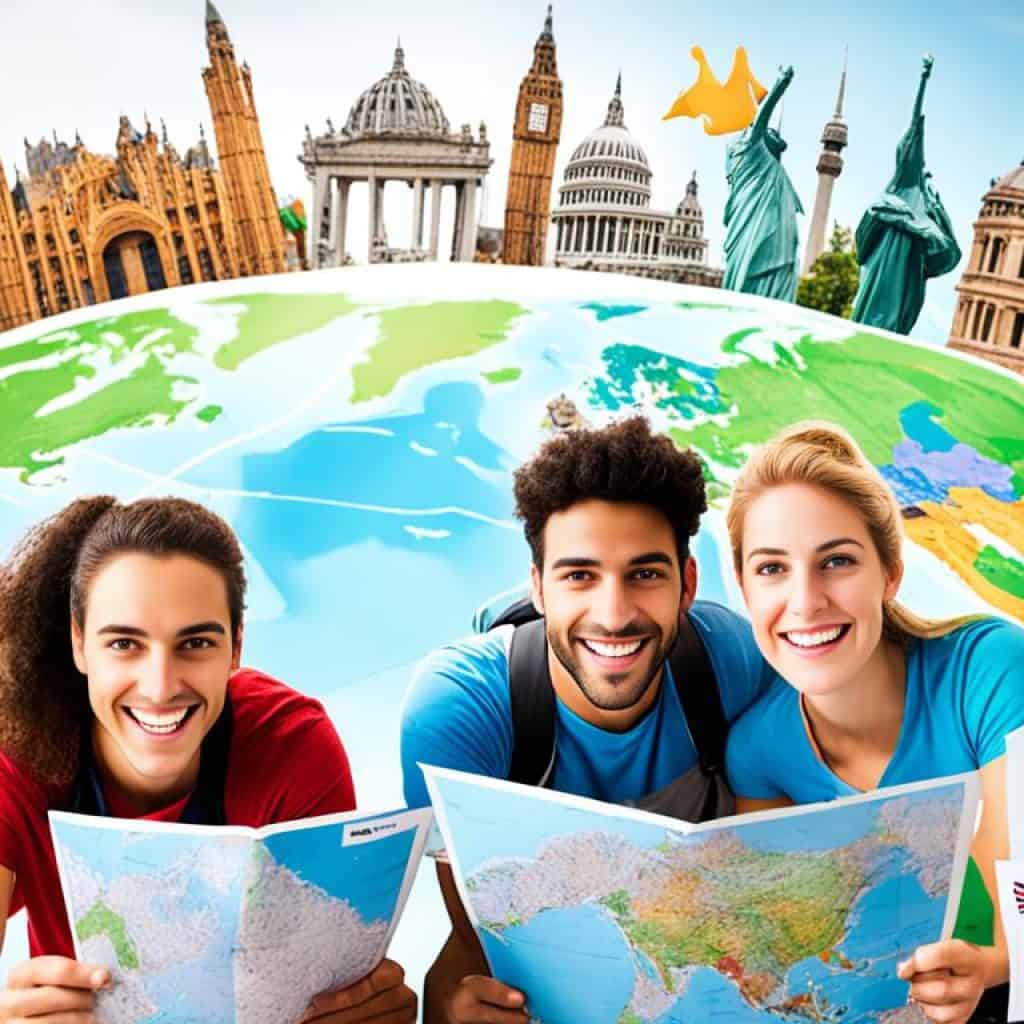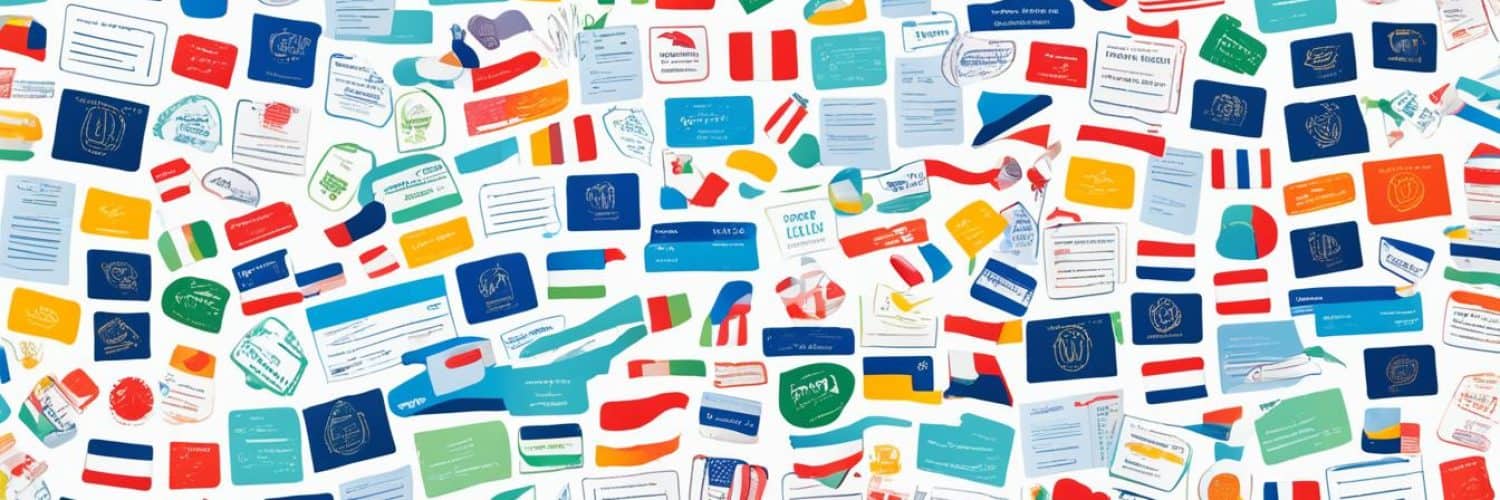Are you planning to travel, work, or study abroad? Do you know the different types of visa options available to you?
Understanding the various visa types is essential when navigating the complex world of global travel and immigration. From tourism to business visits, from temporary work to permanent residency, each visa category has its own specific requirements and eligibility criteria.
In this article, we will delve into the diverse world of visas, highlighting the key features and purposes of each type. Whether you are an adventurous traveler, a skilled worker, a student seeking educational opportunities, or a family member hoping to reunite, this guide will provide valuable insights to help you make informed decisions and pursue your dreams.
Key Takeaways
- There are different types of visas to cater to various purposes such as immigration, travel, work, study, and family reunification.
- Temporary non-immigrant visas are for individuals who wish to come to the United States for a specific period of time.
- Permanent (immigrant) worker visas are for individuals looking to work in the United States permanently.
- Student and exchange visitor visas are for individuals who want to study or participate in exchange programs in the United States.
- Temporary visit for business visas allow individuals to travel to the United States for short-term business purposes.
Temporary Non-Immigrant Visa
Temporary non-immigrant visas provide an opportunity for individuals to come to the United States for a fixed period of time. These visas are commonly sponsored by potential employers on behalf of prospective employees, allowing them to engage in specific activities during their stay.
There are various categories of temporary non-immigrant visas, each catering to specific purposes and fields. Let’s explore some of the most prominent categories:
H-1B Visas
The H-1B visa is designed for professionals or academics who possess specialized knowledge and skills. It allows individuals to work temporarily in the United States, contributing their expertise to American companies and organizations. H-1B visa holders play a vital role in a range of industries, including technology, engineering, healthcare, and more.
H-2A and H-2B Visas
The H-2A and H-2B visas are available for seasonal workers in agricultural and non-agricultural sectors, respectively. These visas provide job opportunities for individuals who can meet temporary labor demands, such as farmworkers during harvest seasons or hospitality staff during peak tourist periods.
I Visas
I visas are specifically reserved for foreign press members. Journalists, reporters, and media personnel can utilize this visa category to cover news and events in the United States, fostering international understanding and exchange of information.
L Visas
The L visa category is intended for intracompany transferees. It enables multinational companies to transfer employees from their overseas branches or subsidiaries to the United States for temporary assignments. L visa holders contribute to the growth and development of businesses by bringing their expertise and knowledge across borders.
O Visas
O visas are granted to individuals with extraordinary abilities in various fields such as sciences, arts, education, business, or athletics. This visa category recognizes exceptional talent and allows individuals to temporarily work in their respective fields in the United States.
R Visas
The R visa category is designed for non-immigrant religious workers. This visa enables religious organizations to bring individuals to the United States temporarily to perform religious duties and contribute to the spiritual well-being of their communities.
These are just a few examples of the temporary non-immigrant visa categories available. Each category has specific criteria and requirements that applicants must meet. It is essential to consult with an immigration attorney or expert to determine the most suitable visa option and navigate the application process smoothly.
By exploring the various temporary non-immigrant visa categories, individuals can seize opportunities to work, contribute, and grow in the United States, all while adhering to the necessary legal procedures and requirements.
Permanent (Immigrant) Workers
If you dream of permanently working in the United States, there are several permanent worker visa options available to you. These visas require an existing offer of employment from an employer who has the proper U.S. Department of Labor certification. Let’s explore the five key types of employment-based visas:
- EB-1 Visas: These visas are for individuals with extraordinary abilities in their fields, such as outstanding professors, researchers, executives, or individuals with extraordinary achievements in arts, sciences, education, or athletics.
- EB-2 Visas: Professionals with advanced degrees or exceptional ability in their fields can apply for EB-2 visas. This category also includes individuals seeking a national interest waiver.
- EB-3 Visas: Skilled and unskilled workers, as well as professionals in various fields such as healthcare, engineering, or technology, can apply for EB-3 visas. Labor certification is required for most applicants.
- EB-4 Visas: If you belong to specialized categories, such as religious workers, broadcasters, or employees of international organizations, you may qualify for EB-4 visas.
- EB-5 Visas: Immigrant investors looking to invest a significant amount of capital in new commercial enterprise and create jobs for U.S. workers can apply for EB-5 visas.
These employment-based visas offer different routes to permanent residency in the United States. Depending on your qualifications and field of expertise, you may be eligible for one of these visas. It’s essential to consult an immigration attorney to determine the most suitable option for your situation.
Student and Exchange Visitors
Student and exchange visitor visas offer exciting opportunities for individuals to come to the United States and participate in educational or cultural exchange programs. Whether you’re eager to pursue academic studies or gain vocational training, there are various student visa options available to suit your goals.
The three main types of student visas are:
- F-1 visas for academic students: These visas are for individuals seeking to enroll in accredited educational institutions in the United States. F-1 visa holders can pursue academic programs, including degrees at universities, colleges, or language schools.
- M-1 visas for vocational students: Designed for individuals who wish to gain practical skills and knowledge in a vocational or non-academic field, M-1 visas allow students to attend vocational schools offering specific training programs.
- J-1 visas for exchange students: J-1 visas are ideal for individuals participating in cultural exchange programs or pursuing academic studies through exchange programs. These visas promote international understanding and foster cultural exchange between the United States and other countries.
One of the great advantages of student visas is the opportunity to work while studying. Each visa type provides unique work opportunities:
- Optional Practical Training (OPT): Available for F-1 visa holders, OPT allows students to work in their field of study for up to one year after completing their academic program. It provides valuable practical experience and enables students to apply their knowledge in a professional setting.
- Practical Training: M-1 visa holders are eligible for practical training, which allows them to gain hands-on experience related to their vocational studies. This aspect enhances their skill set and prepares them for future employment opportunities.
- Academic Training: J-1 visa holders can participate in academic training programs directly related to their course of study. This professional development opportunity enables exchange students to further their knowledge and skills in specialized areas.
As an international student or exchange visitor, you’ll have the chance to immerse yourself in a diverse culture, expand your horizons, and build connections that can last a lifetime. Studying in the United States can also provide a pathway to further opportunities, such as employment or pursuing advanced degrees.
“Studying abroad is not just about academic achievements; it’s about adventure, personal growth, and embracing new perspectives.”
Temporary Visit for Business
For individuals traveling to the United States for short-term business purposes, temporary visit for business visas offer the perfect solution. These visas allow professionals to engage in business-related activities, meetings, conferences, or negotiations without the need for long-term immigration processes.
The most common type of visa in this category is the B-1 visa, which grants temporary entry for business purposes. The B-1 visa is typically issued for a specific period of time, usually up to six months, giving individuals enough flexibility to attend to their professional obligations.
In addition to the B-1 visa, there are other visa options available for specific business needs. These include:
- GB Temporary Visitor to Guam visas: These visas are designed for individuals traveling to the U.S. territories of Guam and the Northern Mariana Islands for business purposes.
- WB Temporary Business Visitor visas: Under the Visa Waiver Program, nationals of certain countries can enter the United States for temporary business visits without the need for a B-1 visa. The WB visa allows visitors to participate in business-related activities for up to 90 days.
Whether you’re attending meetings, negotiating contracts, exploring business opportunities, or engaging in other temporary business activities, the temporary visit for business visas provide the necessary authorization to ensure a smooth and hassle-free trip.
“Traveling to the United States for business? The B-1 visa and other temporary visit for business visas offer the opportunity to achieve your professional goals without the need for lengthy immigration processes.”
To give you a better understanding, here’s a table comparing the key features of the different temporary visit for business visas:
| Visa Type | Eligibility | Duration |
|---|---|---|
| B-1 Visa | Individuals traveling for general business purposes | Up to six months |
| GB Temporary Visitor to Guam Visa | Individuals traveling to Guam and the Northern Mariana Islands for business purposes | Varies |
| WB Temporary Business Visitor Visa | Nationals of certain countries traveling for business purposes under the Visa Waiver Program | Up to 90 days |
With the flexibility and convenience of these visas, temporary visits for business have never been easier. Plan your trip, achieve your business objectives, and make the most of your stay in the United States.
Travel Tips for Business Visitors:
- Prepare all the necessary documents, such as business invitations, conference registrations, or meeting agendas, to facilitate a smooth entry.
- Familiarize yourself with the specific business activities allowed under the B-1 visa or other relevant visa category to ensure compliance with U.S. immigration regulations.
- Be mindful of the duration of your visa and plan your business activities accordingly to make the most of your time in the United States.
- Consult with an immigration attorney or expert for guidance and advice on the visa application process and any specific requirements related to your business visit.
Family Visas
Family visas provide an opportunity for certain family members of U.S. citizens and lawful permanent residents to immigrate to the United States. These visas are based on family ties, allowing eligible individuals to reunite with their loved ones in America. The specific requirements and eligibility criteria for family visas vary depending on the relationship to the U.S. citizen or permanent resident.
Whether you are a spouse, parent, child, or sibling of a U.S. citizen or permanent resident, there may be a family visa category that aligns with your situation. It is essential to understand the specific eligibility criteria and documentation required for each category to ensure a smooth application process.
Family visas not only provide an opportunity for family reunification but also offer a pathway to permanent residency in the United States. Once granted, these visas allow individuals to live, work, and study in the country, enjoying the benefits of being an American resident.
| Family Visa Category | Relationship to U.S. Citizen/Permanent Resident |
|---|---|
| Immediate Relative (IR) Visa | Spouse of a U.S. citizen, unmarried child under 21 years old of a U.S. citizen, parent of a U.S. citizen who is at least 21 years old |
| Family Preference (F) Visa | Unmarried child over 21 years old of a U.S. citizen, married child of a U.S. citizen, sibling of a U.S. citizen |
| IR Visa for Widow(er) | Widow(er) of a U.S. citizen |
| Visa for Victims of Abuse (VAWA) | Abused spouse, child, or parent of a U.S. citizen or permanent resident |
Important Considerations for Family Visas
- Applicants must demonstrate a bona fide relationship with the U.S. citizen or permanent resident sponsoring their visa.
- The sponsor must meet specific income requirements to prove their ability to financially support the visa applicant.
- Processing times and availability of family visas may vary depending on yearly visa quotas and demand.
A family is a precious bond that transcends borders. Family visas provide an avenue for loved ones to reunite, fostering stronger connections and creating a sense of belonging in a new land.
It is recommended to consult with an experienced immigration attorney or expert to navigate the family visa application process successfully. They can guide you through the eligibility requirements, assist with the documentation, and ensure that you have the best chance of obtaining your family visa.
Don’t miss out on the opportunity to be reunited with your family in the United States. Explore the family visa options available to you and take the first step towards creating a brighter future together.
Diversity Visa
The Diversity Visa program, also known as the Green Card Lottery, offers a unique opportunity for individuals from countries with low rates of immigration to the United States to obtain a visa. This annual program makes a limited number of visas available through a random lottery system.
To be eligible for the Diversity Visa, applicants must meet strict requirements and go through a rigorous selection process. Here are the key details:
- Applicants must be from a qualifying country. The list of qualifying countries changes annually and is based on historical rates of immigration to the United States.
- Applicants must have at least a high school education or its equivalent, or have at least two years of work experience in an occupation that requires at least two years of training or experience.
- Applicants must submit their entries within the designated registration period, which typically occurs in the fall of each year.
- Selected applicants are then chosen through a random computer drawing.
- Selected winners are notified by mail and provided with further instructions on how to proceed with their visa application.
The Diversity Visa program provides an opportunity for individuals to pursue a permanent residence in the United States, granting them the freedom to live and work in the country. It promotes cultural diversity and offers a chance for individuals from underrepresented countries to contribute to the rich tapestry of American society.

| Benefits of the Diversity Visa | Limitations of the Diversity Visa |
|---|---|
|
|
Other Visa Categories
In addition to the main visa categories mentioned above, there are various other visa categories available for specific purposes. These include visas for adoption, special immigrant categories, and diplomatic visas. Each of these categories has its own requirements and eligibility criteria.
Whether you are considering adopting a child, fall under a special immigrant category, or require a diplomatic visa, there are visa options available to cater to your specific needs. These specialty visas provide opportunities for unique circumstances that may not fit into the main visa categories.
Visas for Adoption
If you are looking to adopt a child from another country and bring them to the United States, there are visa categories specifically designed for this purpose. The Hague Adoption Convention ensures that intercountry adoptions are carried out with safeguards to protect the best interests of the child. The IR-3 and IR-4 visas are commonly used for adoptive children, depending on whether the adoption process is completed before or after the child enters the United States.
Special Immigrant Categories
Special immigrant categories offer visa options for individuals with unique circumstances and qualifications. These categories include visas for religious workers, employees of international organizations, foreign medical graduates, Afghan and Iraqi translators, and many others. The specific eligibility requirements vary depending on the category, but they provide opportunities for individuals who meet the criteria to immigrate to the United States.
Diplomatic Visas
Diplomatic visas are granted to foreign government officials, their staff, and individuals representing international organizations. These visas allow holders to enter and stay in the United States for diplomatic purposes, such as attending meetings, conducting official business, or representing their country or organization. The A-1, A-2, G-1, G-2, G-3, and G-4 visas are common categories for diplomatic personnel.
Whether you are looking to adopt a child, fall under a special immigrant category, or require a diplomatic visa, it is essential to understand the specific requirements and eligibility criteria for each category. Consulting with an immigration attorney or expert can help guide you through the application process and ensure that you meet all the necessary criteria.
| Visa Category | Purpose | Requirements |
|---|---|---|
| Visas for Adoption | Adopting a child from another country | Satisfying the adoption requirements set by the Hague Adoption Convention |
| Special Immigrant Categories | Unique circumstances and qualifications | Meeting the specific eligibility requirements for each category |
| Diplomatic Visas | Representing foreign governments or international organizations | Being a government official, staff member, or representative of an international organization |
Reciprocity and Civil Documents by Country
When planning to apply for a visa to the United States, it is important to understand the specific requirements and procedures for your country of origin. The U.S. Department of State provides valuable information on visa reciprocity and civil documents for each country, ensuring that you have all the necessary details to complete your application accurately and efficiently.
Reciprocity refers to the principle of treating foreign nationals in a similar manner to how U.S. citizens are treated when visiting their countries. It includes visa validity, fees, and any specific documents that may be required for the application process. By consulting the reciprocity information provided by the U.S. Department of State, you can ensure that you have a clear understanding of what is expected of you and can adequately prepare for your visa application.
Additionally, the U.S. Department of State provides information on civil documents that may be required for your visa application. Civil documents include birth certificates, marriage certificates, divorce decrees, and other documents that establish your identity, family relationships, and civil status. Knowing which documents are required and any specific formatting or authentication requirements is essential for a successful visa application.
To access the reciprocity and civil documents information for your country, visit the U.S. Department of State’s website and search for the specific country you are interested in. The information provided will guide you on visa validity, fees, and required civil documents, ensuring that you are well-prepared.
Sample Visa Reciprocity Information
| Country | Visa Validity | Visa Fees | Required Civil Documents |
|---|---|---|---|
| Canada | Up to 10 years | $160 | Passport, birth certificate |
| United Kingdom | Up to 10 years | $160 | Passport, marriage certificate |
| Australia | Up to 10 years | $160 | Passport, birth certificate |
Immigration Options for Immigrants
Immigrants looking to permanently immigrate to the United States have a range of options available to them. These options include:
- Family-Based Immigration: Immigrants can apply for a family-based visa if they have close family members who are U.S. citizens or lawful permanent residents. This option allows families to be reunited and build a life together in the United States.
- Employment-Based Immigration: Immigrants with specific skills, qualifications, or job offers from U.S. employers can pursue employment-based visas. These visas enable skilled professionals to contribute to the U.S. workforce and bring their expertise to the country.
- Adoption: Immigrants can choose adoption as a pathway to immigration. By adopting a child from another country, individuals or families can provide a loving home and a brighter future for a child while also obtaining legal immigration status.
- Special Immigrant Categories: Certain individuals, such as religious workers, Afghan or Iraqi translators, and victims of human trafficking, can apply for special immigrant visas. These categories aim to provide humanitarian relief and support to individuals in need.
- Diversity Visa Program: The Diversity Visa program, also known as the Green Card Lottery, grants a limited number of visas to individuals from countries with low rates of immigration to the United States. This program promotes diversity and offers a chance for individuals to pursue permanent residency in the United States.
Each immigration category has its own set of requirements and eligibility criteria. It is essential for immigrants to carefully review the specific requirements for their desired category to ensure they meet all the necessary criteria.
Benefits of Immigration Options
Immigration options for immigrants offer numerous benefits:
- Opportunity for a new life: Immigration provides the opportunity for individuals and families to start a new life in a country known for its diversity, opportunities, and protection of human rights.
- Access to education and healthcare: The United States offers world-class education and healthcare systems that provide immigrants with access to quality education for their children and comprehensive medical care for their families.
- Economic opportunities: Immigrants contribute significantly to the U.S. economy. Through employment-based immigration, immigrants can access a wide range of job opportunities and contribute to the growth and development of industries across the country.
- Cultural enrichment: Immigrants bring their unique cultures, traditions, and perspectives, enriching the cultural fabric of the United States and promoting a diverse and inclusive society.
It is important for immigrants to consult with an immigration attorney or expert to navigate the immigration process effectively and ensure a smooth application experience.
| Immigration Option | Requirements | Eligibility Criteria |
|---|---|---|
| Family-Based Immigration | Close family relationship to U.S. citizen or lawful permanent resident | Valid proof of relationship, financial support, and sponsorship |
| Employment-Based Immigration | Job offer from U.S. employer, specific skills, qualifications | Labor certification, petition approval, required employment documents |
| Adoption | Adopting a child from another country | Compliance with adoption laws, background checks, home study |
| Special Immigrant Categories | Qualify under specific special immigrant category | Eligibility determined by category requirements |
| Diversity Visa Program | Eligibility based on country of origin, education, work experience | Random selection through the annual Green Card Lottery |

Travel Options for Tourists
Tourists visiting the United States have a variety of travel visa options depending on their country of origin. One of the most common visas for tourism purposes is the B-2 visa. This visa allows individuals to enter the U.S. for a specific period of time to enjoy leisure activities and explore the country’s unique attractions.
The B-2 visa is ideal for tourists who plan to visit the United States for vacation, sightseeing, visiting family or friends, and participating in recreational activities. It allows travelers to immerse themselves in the American culture and experience the country’s vibrant cities, breathtaking natural landscapes, and world-renowned landmarks.
With a B-2 visa, tourists can indulge in a wide range of activities, such as:
- Exploring iconic destinations like the Statue of Liberty, Grand Canyon, or Golden Gate Bridge
- Visiting famous museums and art galleries, such as the Metropolitan Museum of Art in New York City or the Smithsonian Institution in Washington, D.C.
- Enjoying theme parks like Disneyland or Universal Studios
- Relaxing on stunning beaches in states like California, Florida, or Hawaii
- Participating in cultural events and festivals across the country
“The United States offers a wealth of travel opportunities for tourists from around the world. With the B-2 visa, visitors can create unforgettable memories and explore the diverse landscapes, vibrant cities, and rich cultural heritage that make America a top destination.”
It’s important to note that the B-2 visa is generally issued for a duration of up to six months, providing ample time for tourists to make the most of their visit. However, the specific length of stay is determined by the U.S. Customs and Border Protection (CBP), and it is crucial to adhere to the authorized period and comply with all immigration regulations.
To apply for a B-2 visa, tourists typically need to submit the required documentation, including a completed visa application form, a valid passport, proof of financial capability to cover expenses during the visit, and evidence of ties to their home country to demonstrate their intention to return after the visit.
| Type of Visa | Duration | Activities Allowed |
|---|---|---|
| B-2 Visa | Up to 6 months (determined by CBP) |
|
Whether it’s exploring the vibrant streets of New York City, lounging on the sunny beaches of California, or soaking in the natural wonders of national parks, the B-2 visa opens up a world of possibilities for tourists to create unforgettable memories in the United States.
Work Options for Foreign Workers
The H-1B visa is designed for foreign workers in specialized occupations, typically requiring a bachelor’s degree or its equivalent. It allows individuals to work for a specific employer in the United States for a specified period of time. The H-1B visa is a popular choice for professionals in fields such as IT, engineering, finance, and medicine.
Both the H-1B and L-1 visa categories have specific requirements and qualifications that applicants must meet. Additionally, a job offer from a U.S. employer is necessary to apply for these work visas.
If you are considering working in the United States, it is essential to understand the specific requirements and eligibility criteria for each visa category. Consulting with an immigration attorney or expert can provide you with the guidance needed to navigate the application process successfully.
Study Options for International Students
International students have the incredible opportunity to pursue their academic goals in the United States through student visa programs. The U.S. offers a diverse range of educational institutions renowned for their academic excellence and innovation. Here, students can immerse themselves in cutting-edge research, collaborate with world-class faculty, and gain a global perspective that prepares them for success in their future careers.
The two main study visa options for international students are the F-1 visa for academic students and the M-1 visa for vocational students. These visas open the doors to world-class education and provide opportunities to explore one’s passions and interests.
1. F-1 Visa for Academic Students
The F-1 visa is designed for international students seeking to enroll in academic programs offered by universities, colleges, high schools, or other academic institutions in the United States. This visa allows individuals to study full-time and engage in practical training related to their field of study.
Key features of the F-1 visa include:
- Enrollment in a recognized educational institution
- Ability to work on-campus or off-campus with proper authorization
- Optional Practical Training (OPT) that allows international students to gain work experience in their field of study
2. M-1 Visa for Vocational Students
The M-1 visa is intended for international students who wish to pursue vocational or non-academic programs, such as technical courses or trade schools. This visa enables students to develop practical skills in specific fields and enhances their prospects for employment in their home countries.
Key features of the M-1 visa include:
- Enrollment in vocational or non-academic programs
- Ability to work on-campus if it is an integral part of the program
- Practical Training (PT) that allows students to engage in work directly related to their field of study
Both the F-1 and M-1 visas provide international students with an opportunity to receive a world-class education in the United States while immersing themselves in a culturally diverse environment. These visas not only offer academic growth but also foster personal development, cross-cultural understanding, and the building of lifelong connections.

Studying abroad is a transformative experience that broadens horizons, challenges minds, and unlocks endless possibilities. It equips students with critical skills, fosters independence, and enables them to become global citizens who can shape a better tomorrow.
Table: Comparison of F-1 and M-1 Visas for International Students
| F-1 Visa | M-1 Visa |
|---|---|
| Designed for academic programs | For vocational or non-academic programs |
| Allows full-time study | Focuses on developing practical skills |
| Allows Optional Practical Training (OPT) | Provides Practical Training (PT) |
| Enables work on-campus and off-campus | Allows on-campus work if an integral part of the program |
Business Options for Entrepreneurs
Entrepreneurs and business professionals looking to start or invest in businesses in the United States have specific visa options. Two popular visa categories for entrepreneurs are the E-2 visa and the EB-5 visa.
E-2 Visa for Treaty Investors
The E-2 visa is available for entrepreneurs from certain treaty countries who wish to invest in a U.S. business. To be eligible for this visa, the entrepreneur must make a substantial investment in a new or existing enterprise and have a comprehensive business plan. The investment must be sufficient to ensure the business’s successful operation, and the entrepreneur must also show that their investment will create employment opportunities for U.S. workers.
With an E-2 visa, entrepreneurs can live and work in the United States for an initial period of two years. This visa can be renewed indefinitely as long as the business remains operational and meets the visa requirements.
EB-5 Visa for Immigrant Investors
The EB-5 visa program is designed for entrepreneurs who are willing to make a significant investment in a new commercial enterprise that creates jobs for U.S. workers. To qualify for an EB-5 visa, the entrepreneur must invest a minimum of $1.8 million, or $900,000 in a targeted employment area (TEA), and create at least 10 full-time jobs for qualifying U.S. workers within two years of receiving the visa.
Once approved, EB-5 visa holders and their immediate family members can obtain conditional permanent residency in the United States. After two years, if the investment and job creation requirements are met, the conditional status can be removed, and the entrepreneur and their family can become permanent residents of the United States.
| Visa Category | Investment Requirement | Job Creation Requirement | Residency |
|---|---|---|---|
| E-2 Visa | Varies based on business plan | Create employment opportunities | Renewable |
| EB-5 Visa | $1.8 million or $900,000 in TEA | Create 10 full-time jobs | Conditional Permanent Residency |
Both the E-2 and EB-5 visas offer unique opportunities for entrepreneurs to pursue their business ventures in the United States. It is important for entrepreneurs to consult with immigration attorneys or experts to determine the most suitable visa option for their specific situation.
Conclusion
In conclusion, the United States provides a diverse array of visa options catering to different purposes, whether it be immigration, travel, work, or study. To ensure a successful visa application, it is crucial to thoroughly understand the specific requirements and eligibility criteria for each visa category.
For a seamless visa process, seeking guidance from an experienced immigration attorney or expert is highly recommended. These professionals possess the knowledge and expertise to navigate the complexities of the visa application process, providing valuable advice and assistance.
Whether you are planning to permanently immigrate, explore the country as a tourist, work in a specific industry, or pursue academic opportunities, the United States has visa categories tailored to your needs. Understanding and complying with the visa requirements will increase your chances of obtaining a visa and realizing your dreams in the land of opportunities.
FAQ
What are the different types of visas available?
The different types of visas available include immigration visas, travel visas, work visas, student visas, tourist visas, business visas, family visas, and permanent visas.
What is a temporary non-immigrant visa?
A temporary non-immigrant visa is for individuals who wish to come to the United States for a fixed period of time. There are various categories of temporary non-immigrant visas, including H-1B, H-2A, H-2B, I, L, O, and R visas, depending on the purpose of travel.
What are permanent (immigrant) worker visas?
Permanent worker visas are for individuals looking to permanently work in the United States. These visas require an existing offer of employment and fall under categories such as EB-1, EB-2, EB-3, EB-4, and EB-5 visas.
What are student and exchange visitor visas?
Student and exchange visitor visas are for individuals who wish to come to the United States for educational or cultural exchange programs. The main types of student visas are F-1, M-1, and J-1 visas.
What is a temporary visit for business visa?
A temporary visit for business visa allows individuals to travel to the United States for short-term business purposes. The most common type of visa in this category is the B-1 visa.
What are family visas?
Family visas are available for certain family members of U.S. citizens and lawful permanent residents. These visas are based on family ties and allow eligible family members to immigrate to the United States.
What is the Diversity Visa?
The Diversity Visa, also known as the Green Card Lottery, is an annual program that makes a limited number of visas available to individuals from countries with low rates of immigration to the United States. Applicants are chosen through a random lottery system.
Are there other visa categories available?
Yes, there are various other visa categories available for specific purposes, including visas for adoption, special immigrant categories, and diplomatic visas.
Where can I find information on visa reciprocity and civil documents?
The U.S. Department of State provides information on visa reciprocity and civil documents for each country, including details on visa validity, fees, and required documents for visa applications.
What are the immigration options for immigrants?
Immigrants looking to permanently immigrate to the United States have options such as family-based immigration, employment-based immigration, adoption, special immigrant categories, and the Diversity Visa program.
What are the travel options for tourists?
Tourists visiting the United States have different travel visa options depending on their country of origin. The most common visa for tourism purposes is the B-2 visa.
What are the work options for foreign workers?
Foreign workers looking to work in the United States have various work visa options depending on their employment situation and qualifications. The most common work visas are the H-1B visa and the L-1 visa.
What are the study options for international students?
International students have the opportunity to study in the United States through student visa programs. The most common student visas are the F-1 visa and the M-1 visa.
What are the business options for entrepreneurs?
Entrepreneurs and business professionals looking to start or invest in businesses in the United States have specific visa options such as the E-2 visa and the EB-5 visa.








Add comment